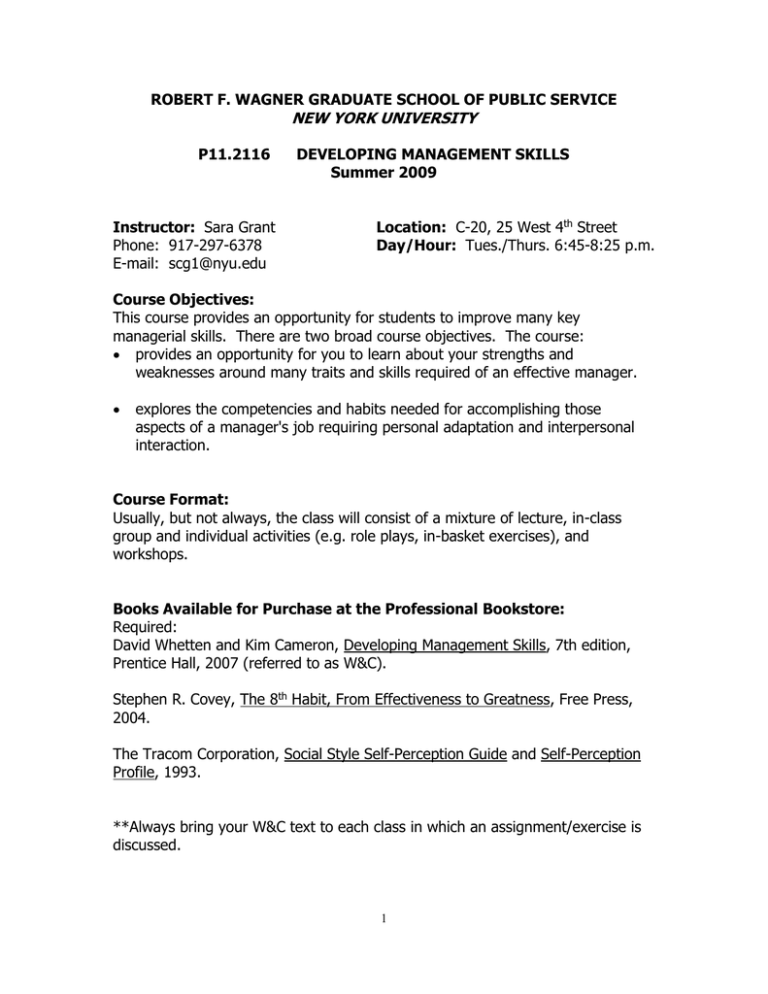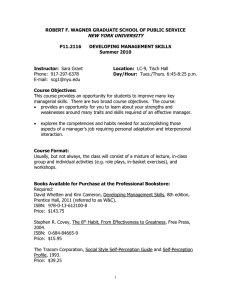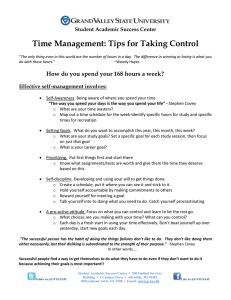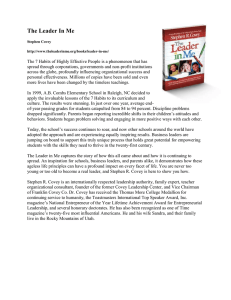ROBERT F. WAGNER GRADUATE SCHOOL OF PUBLIC SERVICE NEW YORK UNIVERSITY
advertisement

ROBERT F. WAGNER GRADUATE SCHOOL OF PUBLIC SERVICE NEW YORK UNIVERSITY P11.2116 Instructor: Sara Grant Phone: 917-297-6378 E-mail: scg1@nyu.edu DEVELOPING MANAGEMENT SKILLS Summer 2009 Location: C-20, 25 West 4th Street Day/Hour: Tues./Thurs. 6:45-8:25 p.m. Course Objectives: This course provides an opportunity for students to improve many key managerial skills. There are two broad course objectives. The course: provides an opportunity for you to learn about your strengths and weaknesses around many traits and skills required of an effective manager. explores the competencies and habits needed for accomplishing those aspects of a manager's job requiring personal adaptation and interpersonal interaction. Course Format: Usually, but not always, the class will consist of a mixture of lecture, in-class group and individual activities (e.g. role plays, in-basket exercises), and workshops. Books Available for Purchase at the Professional Bookstore: Required: David Whetten and Kim Cameron, Developing Management Skills, 7th edition, Prentice Hall, 2007 (referred to as W&C). Stephen R. Covey, The 8th Habit, From Effectiveness to Greatness, Free Press, 2004. The Tracom Corporation, Social Style Self-Perception Guide and Self-Perception Profile, 1993. **Always bring your W&C text to each class in which an assignment/exercise is discussed. 1 Statement of Course Expectations: The following are the expectations for professional class work and conduct for Developing Management Skills. 1. Students are expected to attend every class on time. 2. Students are expected to participate in class discussions. 3. Students are expected to accord the same professional respect to their classmates' contributions as they would to the instructor's. 4. If an absence is unavoidable, students are expected to make arrangements with a fellow student to obtain handouts and get an update on topics and announcements. 5. Students are to keep a copy of their assignments in the event of a loss. 6. All students will receive a grade at the end of the term. No incompletes. 7. Late assignments will be accepted but points will be deducted. 8. Students should avoid multi-tasking with phone or computer. COURSE TOPICS, READINGS, AND ASSIGNMENTS SESSION 1: THE SKILLS OF EFFECTIVE MANAGERS May 26 SESSION 2: DEVELOPING SELF-AWARENESS I: SOCIAL STYLES May 28 Read: W&C pp. 3-23 Assignment: Begin to complete and score your Personal Assessment of Management Skills (PAMS). This can be found on Blackboard. Bring to class Social Style Self-Perception Profile. Do not read the Self-Perception Guide. ***Distribute the PAMS to at least 5 people to evaluate you. This assignment makes it possible for you to develop what is often referred to as a "360 degree" personal skills profile. We will call it a personal SPOT analysis. Your PAMS 2 should be returned to you no later than June 11. Also, begin to interview managers for first graded assignment. SESSION 3: DEVELOPING SELF-AWARENESS II: DIAGNOSTIC SURVEYS June 2 Read: Social Style Self-Perception Guide Assignment: Complete, score, and be prepared to discuss your responses to the following self-assessment exercises: Self-Awareness Assessment, W&C, p. 46 Emotional Intelligence Assessment, W&C, p. 47 Defining Issues Test, W&C, p. 48 The Learning Style Inventory W&C, p. 52 SESSION 4: DEVELOPING SELF-AWARENESS III: SURVEYS AND STYLE June 4 Read: Covey, Chapters 1-5 Assignment: Complete, score, and be prepared to discuss your responses to the following self-assessment exercises: Locus of Control Scale, W&C, p. 54 Tolerance for Ambiguity Scale, W&C, p. 56 Core Self-Evaluation Scale, W&C, p. 57 Submit Exercise for Interviewing Managers, W&C, pp. 28-29. SESSION 5: DEVELOPING SELF-AWARENESS IV: SSS SOFTWARE June 9 Assignment: Submit in-basket exercise, SSS Software, W&C pp. 30-41. Carefully follow the instructions on p. 30. Bring 2 copies to class; submit one copy to the instructor. Complete "Through the Looking Glass" pp. 93-94 and be prepared to discuss. SESSION 6: COMMUNICATING SUPPORTIVELY June 11 3 Read: W&C pp. 238-269 Submit: Social Style Assignment SESSION 7: MANAGING STRESS/Covey June 16 Read: W&C pp. 110-150 Covey, Chapter 6 Submit: Complete Life-Balance Exercise pp. 160-162. SESSION 8: PROBLEM-SOLVING SKILLS June 18 Read: W&C pp. 172-213 Submit: Personal Profile SESSION 9: MANAGERIAL POWER AND INFLUENCE June 23 Read: W&C pp. 284-313 Covey, Chapters 7-9 Submit: Skill Application I SESSION 10: MOTIVATION TECHNIQUES AND PERFORMANCE IMPROVEMENT June 25 Read: W&C pp. 328-357 SESSION 11: MANAGING CONFLICT June 30 Read: W&C pp. 378-408 Covey, Chapter 10 and 11 Submit: Skill Application II 4 SESSION 12: EMPOWERING AND DELEGATING July 2 Read: W&C pp. 444-477 SESSION 13: BUILDING EFFECTIVE TEAMS July 7 Read: W&C pp. 494-522 Covey, Chapters 12 and 13 Submit: Complete exercise on building effective teams, pp. 527-528. Be prepared to discuss in class. SESSION 14: LEADING POSITIVE CHANGE July 9 Read: W&C pp. 538-571 Covey, Chapters 14 and 15 Submit: Final Assignment DUE DATES FOR GRADED ASSIGNMENTS: 6/4 6/11 6/18 6/23 6/30 7/9 Exercise for Interviewing Managers (15 points) Social Style Assignment (10 points) Personal Profile (25 points) Skill Application I (10 points) Skill Application II (10 points) Final Assignment (20 points) **Your meeting class expectations will be awarded up to 10 points. 5



